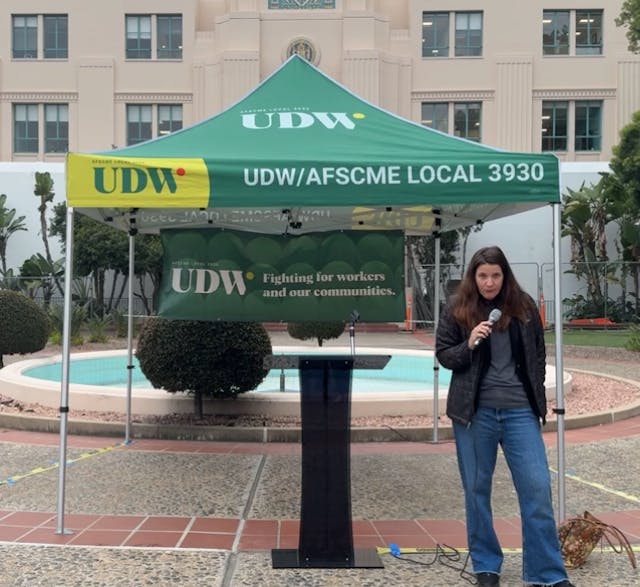Will Juarez Murder “Trial of the Year” Bring Justice to Families?
Frontera NorteSur

Juan Martinez is convinced that Manuel “El Meny” Vital Anguiano had something to do with the disappearance of his 16-year-old daughter Brianda in 2011. Vital is currently on trial in Ciudad Juarez together with five other men accused of human trafficking and murder in the deaths of 11 girls and women whose remains were found in the Juarez Valley in 2012.
Brianda Cecilia Martinez was not among the victims identified from the secret burial grounds, but her association with Vital and the manner of the teen’s subsequent disappearance are common links with the Juarez Valley case, according to the father’s account. Martinez told FNS how Brianda worked for Vital cleaning his downtown Juarez store where the older man sold burritos and other items. Brianda lasted two weeks before informing Vital that she would be quitting. The next day she vanished.
Martinez said he questioned Vital about Brianda’s whereabouts, but the small businessman denied knowing anything about her. Still, Vital’s business style, his purported interest in young girls and rumors of his access to visas allowing passage to neighboring El Paso, Texas, roused Martinez’s suspicions.
“If he wasn’t the one who took her, he set her up,” Martinez insisted. “El Meny” could have been the “hook” in disappearing Brianda and other girls and passing them along to others, he said.
Martinez and other relatives of missing and murdered young women are keeping close tabs on the court case against Vital and his co-defendants which kicked off April 13 in an event dubbed “The Trial of the Year” by the local press. In a judicial proceeding also termed “historic” by some, the Chihuahua State Prosecutor (FGE) is seeking the maximum sentence of life in prison plus an additional 261 years for crimes allegedly committed by Vital, Edgar Jesus Regalado Villa, Cesar Felix Romero, Esparza, Jose Gerardo Puentes Alba, Jesus Hernandez Martinez, and Jose Antonio Contreras Terrazas. The men were arrested in 2013.
Recovered from the rural Juarez Valley, the victims included Maria Guadalupe Perez Montes, Lizbeth Aviles Garcia, Perla Ivonne Aguirre Gonzalez, Idaly Juache Laguna, Beatriz Alejandra Hernandez Trejo, Jessica Leticia Pena Garcia, Deisy Ramirez Munoz, Andrea Guerrero Venzor, Monica Liliana Delgado Castillo, Jessica Terrazas Ortega, and Jazmin Salazar Ponce.
The remains of several other women were also recovered from the Navajo Arroyo, the same spot where most of the 11 victims at the center of the Juarez trial were likewise found, but until now the defendants have not been charged with the additional slayings.
Essentially, the six men are accused of participating in an organized criminal network that utilized false employment fronts to lure and kidnap young women between 2009 and 2011, work their captives as prostitutes and drug vendors and then finally kill them.
Prosecutors have implicated the transnational Aztecas gang in the murder spree. Originating in the Texas prison system and later spreading to El Paso, Juarez and New Mexico, the underworld group was a principal protagonist in the so-called narco war in Juarez between 2008 and 2012 that left more than 12,000 people slain.
In addition to the gender nature of the Juarez Valley crimes, the systematic abduction and slaughter of young women smacked of class femicide since the victims hailed from low-income families desperate for work. No female victims of wealthy or upper middle class families were found in the hidden graveyards of the Juarez Valley.
The Juarez Valley court case has stirred speculation about the possible involvement of at least some of the suspects in previous mass murders of women, or organized serial femicides, as coined by Juarez scholar Dr. Julia Monarrez Fragoso. For instance, the mother of 1995 murder victim Olga Alicia Carrillo Perez, has linked her daughter to “El Meny.”
Mother Paula Flores said “it was possible” that the group on trial could be involved with the 1998 murder of her 17-year-old daughter Sagrario, because of geographic similarities in the selection of the Juarez Valley as a dumping ground for Sagrario and later murder victims from the city.
State authorities allege that a center of the 2009-2011 kidnap-for-prostitution operation was the now-shuttered Verde Hotel, a place reputedly frequented by soldiers and federal police officers. So far, no soldiers or policemen have testified in the trial of the six men.
“One can’t imagine how much evil there was at that candy store and burrito place,” said Luz Elena Munoz, who attended the first day of the Juarez trial. Munoz’s daughter, Nancy Ivet Navarro Munoz, was 18 years old when she disappeared went missing in 2011.
Munoz said Nancy left home one day holding a folder containing personal documentation so she could apply for a job at the Modas Telas store in downtown Juarez. Almost four years later, Nancy’s mom does not know what happened to her daughter. Modas Telas employees told the searching mother that Nancy never applied for a job at the store, Munoz said.
Munoz said she encountered problems with getting law enforcement to properly investigate Nancy’s disappearance. At one point Munoz said she asked for help from the Federal Police, which was charged with security in the border city at a time when warring organized criminal gangs were tearing it apart, but was told Nancy’s absence was a state and not a federal matter.
“If they had investigated from the beginning, perhaps I’d be content,” Munoz reflected.
Nancy left behind a three-month-old baby girl. Nowadays, the little girl is curious about her mother. “When is my mom coming back?” Munoz said the child regularly asks.
It should be noted that at the time of the disappearances of Brianda Martinez, Nancy Navarro and scores of other girls and women the Mexican government was under an obligatory sentence of the Inter-American Court of Human Rights (IACHR) to prevent and professionally investigate such disappearances with a gender perspective in mind.
For Munoz and other relatives observing or testifying in the trial, the experience is emotionally trying.
“It’s very sad that the mothers have to be there with the ones who are responsible,” said Perla Reyes, mother Jocelyn Calderon Reyes, a 13-year-old who vanished in downtown Juarez in 2012.
Conducted under the new oral system promoted in Mexico by the U.S. Agency for International Development, the trial is a potentially unprecedented one for Ciudad Juarez. Three women judges-Catalina Ruiz Pacheco, Emma Teran Murrillo and Mirna Luz Rocha Pineda-preside over the case.
And for the first time, representatives of two non-governmental organizations that have been long protested the government’s response to gender violence, Justice for Our Daughters and the Women’s Roundtable of Ciudad Juarez, are directly assisting the prosecution.
At the heart of the case is information gathered by family members who acted as detectives painstakingly investigating their loved one’s disappearance.
Now completing its second week, the trial has been covered by Mexican media outlets including El Diario de Juarez, Norte, La Jornada and Proceso newsweekly. Despite the significance of the case, scant news of it has appeared in the U.S. press.
As reported in the Mexican media and in press statements issued by the FGE, the first days of the trial have included testimonies from victims’ family members and reports of possible leads of what happened to the missing girls and women. For example, Deisy Ramirez, who vanished after leaving for her job at an export assembly plant, or maquiladora, was reportedly later seen in the company of an older man applying for a job at another factory, according to the FGE.
Yet, serious weaknesses riddle the state’s case. The alleged leader of the ring behind the Juarez Valley crimes, Adrian Arturo Roldan, aka “El Miguelito” and “Zeta Uno,” was killed by police in 2013.
According to Norte, the state’s star witness, Luis Jesus Ramirez Loera, was earlier exposed providing false information about another original suspect, Jesus “El Patacho” Perez Ortega, who it turned out was in prison when the crimes occurred.
Hovering over the trial is the state’s long history of fabricating scapegoats for serial femicides in both Juarez and Chihuahua City.
A big skeptic of the prosecution’s case is a man intimately familiar with the scapegoat mill. In 2001, criminologist Oscar Maynez resigned from the Chihuahua attorney general’s office after he was asked to plant evidence against two bus drivers accused of the murders of eight women found dumped in a Ciudad Juarez cotton field, the very episode that resulted in the involvement of the Costa Rica-based IACHR in the femicides of Juarez and Chihuahua.
“The outcome of this trial is known. They are going to be found guilty. We’ve seen this story before,” Maynez told FNS. “This is a politically charged case. You have a monstrosity of a situation… the problem is, young girls get kidnapped and killed and the authority wants to give a political solution to a criminal problem.”
Maynez maintained that the state’s case lacks “solid evidence” such as photographs, recordings of phone calls, fingerprints, DNA from houses, etc. Relying on witnesses’ memories simply is not trustworthy, he said.
Maynez expressed incredulousness at the official narrative of the Juarez Valley case that holds the girls were kidnapped in downtown Juarez but kept working in the same zone at a time when their photos were all over the place and everybody was looking for them, as well as the later discovery of victims in the Juarez Valley when it was crawling with police and military.
What’s more, the state’s version of Adrian Roldan giving a death-bed confession to the Juarez Valley crimes after he was shot by police is hard to swallow, Maynez said.
“I’m not convinced,” he said.
The criminal expert admitted that he was most familiar with the pending case against another Juarez Valley suspect, Camilo del Real Buendia, who is jailed for the crimes but not on the dock in the current trial. Maynez was asked by del Real’s relatives to review the charges against the arrested man, and quickly detected problems with the official story, he said.
“If you see the case file, it’s like a fantastic novel. He’s even accused of trafficking organs,” Maynez added. “I analyzed the file and there is clearly nothing there.”
As the owner of a small modeling agency, del Real had 2000 job applications on file from young women- none of whom was disappeared, Maynez stressed. He also challenged the earlier prosecution of Victor Chavira Garcia, an elderly man and downtown boot store owner who was arrested with the other Juarez Valley defendants in 2013 but died in prison awaiting trial.
According to Maynez, Chavira voluntarily went to the police with a video captured in his business of a girl who had sought employment and was later reported missing. The result? Chavira was arrested.
Judicial reforms operative in the Juarez Valley case notwithstanding, Maynez contended that the old judicial system vices of judges under the thumb of politicians and shoddy evidence are still at work behind the scenes.
Family activist Jose Luis Castillo said he and other relatives seek genuine justice. “We hope that the authorities manage to prove that these people are guilty, because we parents provided evidence against three of the people who are being tried. We want (defendants) to be truly guilty. Otherwise, they will be scapegoats and girls will keep disappearing.”






